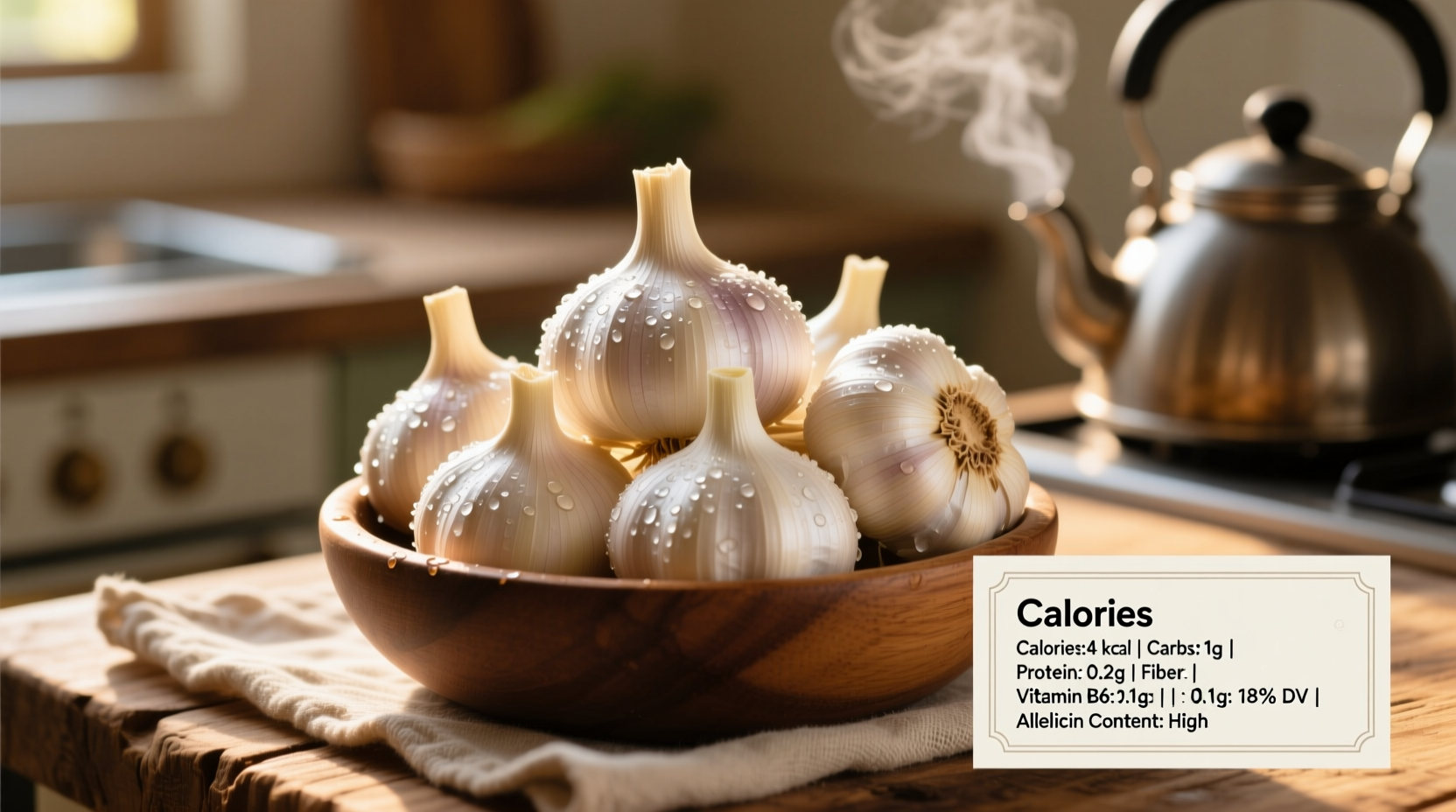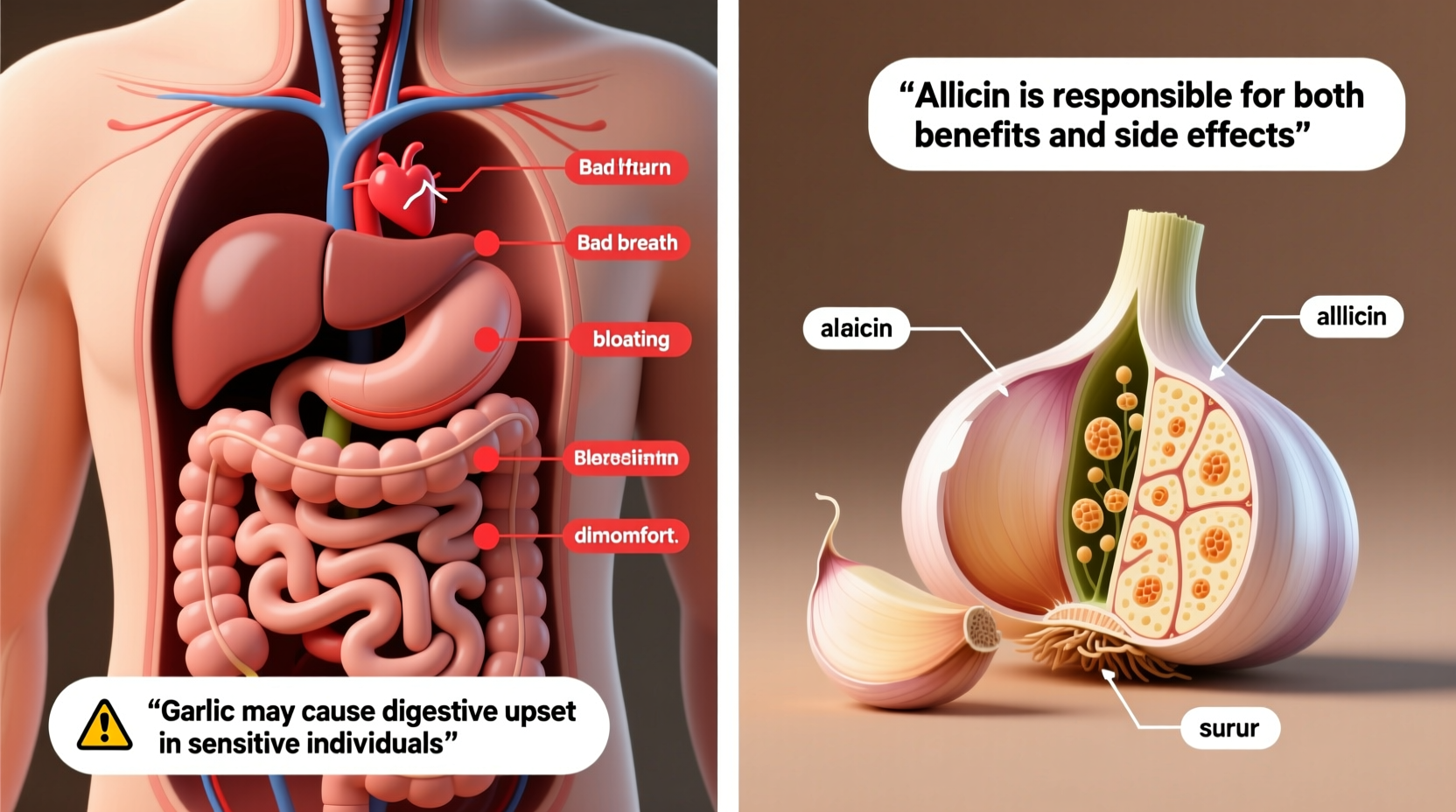What You Need to Know About Garlic Side Effects
While garlic offers impressive health benefits, understanding its potential side effects helps you enjoy this powerful ingredient safely. This guide provides evidence-based information about garlic's common and serious side effects, who should exercise caution, and practical strategies to minimize discomfort while maximizing benefits.
Common Garlic Side Effects You Might Experience
Most garlic side effects are mild and occur primarily with raw garlic consumption. These typically include:
- Halitosis (garlic breath) - Sulfur compounds enter your bloodstream and exit through your lungs
- Body odor - Same sulfur compounds exit through skin pores
- Heartburn or acid reflux - Particularly with raw garlic on an empty stomach
- Digestive discomfort - Bloating, gas, or abdominal pain in sensitive individuals
- Nausea - Especially when consuming large amounts of raw garlic
These common reactions rarely require medical attention and often diminish as your body adjusts to regular garlic consumption. Cooking garlic significantly reduces these gastrointestinal side effects compared to raw consumption.

When Garlic Side Effects Become Serious
While uncommon, certain garlic side effects warrant medical attention. Be aware of these more serious reactions:
| Common Side Effects | Serious Side Effects | When to Seek Help |
|---|---|---|
| Bad breath | Excessive bleeding | Before surgery or if on blood thinners |
| Mild heartburn | Severe allergic reactions | Difficulty breathing, swelling |
| Digestive discomfort | Low blood sugar | If diabetic on medication |
| Body odor | Liver toxicity | With high-dose supplements |
Who Should Be Cautious With Garlic
Certain populations face higher risks from garlic consumption. Consider these important context boundaries:
Medication Interactions
Garlic can interact with several medications, particularly:
- Blood thinners (warfarin, aspirin) - increases bleeding risk
- HIV medications (saquinavir) - may reduce effectiveness
- Diabetes medications - may cause blood sugar to drop too low
- Blood pressure medications - may enhance effects causing hypotension
If you take any prescription medications, consult your healthcare provider before significantly increasing garlic intake or taking supplements.
Special Populations
Extra caution is advised for:
- Pregnant women - While food amounts are generally safe, high doses may affect fetal development
- Breastfeeding mothers - Garlic can pass to infants and cause fussiness
- Children - Raw garlic may cause irritation; consult pediatrician before giving supplements
- Pre-surgery patients - Stop garlic supplements at least 7-10 days before procedures
Garlic Supplements vs. Fresh Garlic: Different Risk Profiles
Many people don't realize that garlic supplements carry different risk profiles than culinary garlic:
- Higher concentration - Supplements contain 4-5 times more active compounds than fresh garlic
- Standardized doses - Unlike variable fresh garlic, supplements deliver consistent (and potentially excessive) amounts
- Processing methods - Aged garlic extract has different side effect profiles than raw garlic oil
- Longer exposure - Supplement users often consume garlic compounds daily without breaks
According to the National Institutes of Health's Office of Dietary Supplements, supplement users report side effects at rates 3-4 times higher than those consuming garlic in food. Research indicates that aged garlic extract generally causes fewer gastrointestinal issues than raw garlic or garlic powder supplements.
Practical Strategies to Minimize Garlic Side Effects
You don't need to eliminate garlic to avoid discomfort. Try these evidence-based approaches:
For Digestive Comfort
- Cook garlic rather than consuming raw
- Start with small amounts (1/4 to 1/2 clove) and gradually increase
- Pair garlic with other foods rather than eating on empty stomach
- Consider enteric-coated supplements that release in the intestine
Managing Social Side Effects
- Eat apples or lettuce after garlic consumption to reduce breath odor
- Drink lemon water or chew parsley to freshen breath
- Take supplements at bedtime to minimize social impact of odor
- Use topical antiperspirants to reduce garlic body odor
When Benefits Outweigh Potential Side Effects
For most healthy adults, the health benefits of moderate garlic consumption far outweigh potential side effects. Research published in the Journal of Nutrition shows that regular garlic intake provides significant cardiovascular benefits, including reduced blood pressure and improved cholesterol profiles.
The key is moderation - most studies showing benefits use 1-2 cloves of fresh garlic daily (approximately 3-6 grams). This amount typically causes minimal side effects while delivering therapeutic benefits.
Frequently Asked Questions
Can garlic cause liver damage?
While rare, extremely high doses of garlic supplements (particularly raw garlic oil) have been associated with liver toxicity in case reports. Normal culinary use of garlic poses no liver risk for healthy individuals. Those with pre-existing liver conditions should consult their physician before taking garlic supplements.
How much garlic is too much in a day?
For most adults, consuming more than 5 cloves (about 15 grams) of raw garlic daily increases the likelihood of significant side effects. The European Medicines Agency recommends not exceeding 5 grams of fresh garlic daily. Supplement doses should follow product instructions but typically range from 600-1,200 mg of aged garlic extract daily.
Does cooking garlic eliminate side effects?
Cooking reduces but doesn't eliminate garlic side effects. Heat deactivates the enzyme alliinase responsible for creating the compounds that cause breath and digestive issues, making cooked garlic generally better tolerated. However, some sulfur compounds remain and can still cause mild effects, especially in sensitive individuals or when consumed in large quantities.
Can I be allergic to garlic?
Yes, garlic allergies do occur, though they're relatively uncommon. Symptoms include skin rash, itching, swelling, difficulty breathing, and digestive distress shortly after consumption. If you suspect a garlic allergy, consult an allergist for proper testing. People with allergies to other Allium family plants (onions, leeks, chives) may have cross-reactivity with garlic.
Does garlic interact with blood pressure medication?
Yes, garlic may enhance the effects of blood pressure medications, potentially causing your blood pressure to drop too low. If you take medication for hypertension, monitor your blood pressure regularly when increasing garlic consumption and consult your doctor about appropriate amounts. The interaction appears more significant with garlic supplements than culinary garlic.











 浙公网安备
33010002000092号
浙公网安备
33010002000092号 浙B2-20120091-4
浙B2-20120091-4